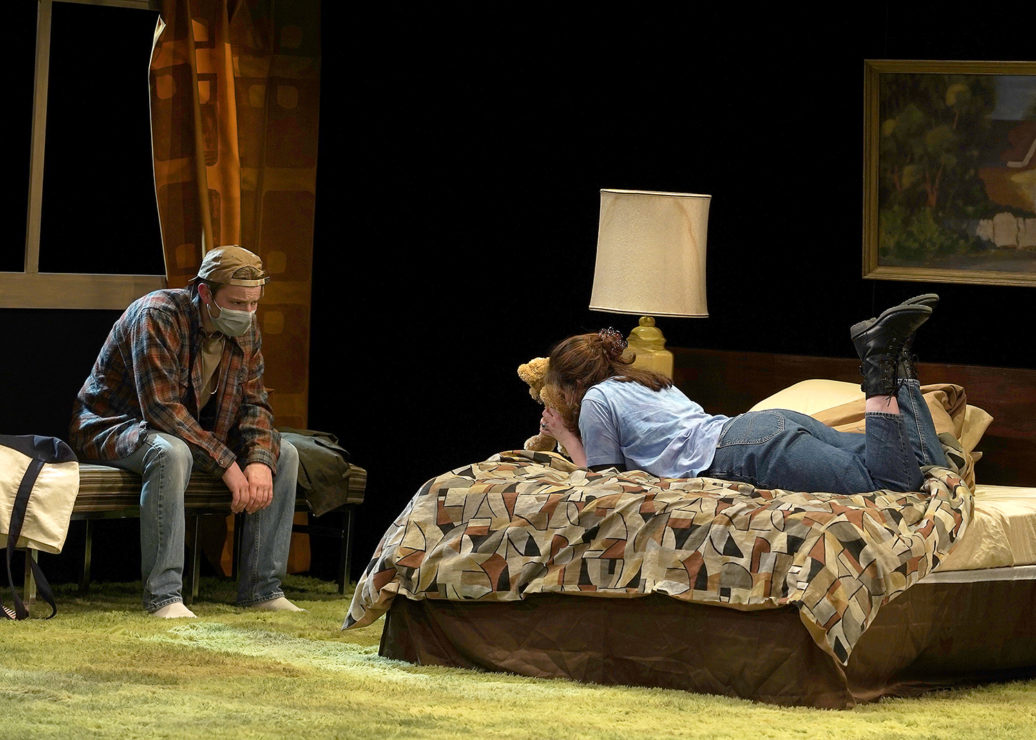
Short-lived campus production offers a nice break from theatrical Zoom script reads
On March 24, 2021, the Phoenix launched a four night run of Problem Child, their first full live-streamed, socially-distanced production since drawing the curtains last year. Directed by Fran Gebhard and written by Canadian Playwright George F. Walker, the play explores themes of isolation, uncertainty, and tension — all too familiar in our COVID-19 era.
Problem Child tells the story of RJ and Denise who are trapped waiting in a hotel room indefinitely while trying to regain custody of their biological child. As the support worker’s evaluation of them continues to draw on Denise gets desperate. RJ distracts himself with reality TV and gets angry at small injustices while Denise tries to take action that blows up in her face. She is judged for her choices by the other characters and told she should just wait like RJ.
Though the play isn’t about COVID-19, it explores familiar themes of isolation, uncertainty, and growing tension. RJ and Denise are desperately trying to prove to the social worker that they’ve become better, well-adjusted people while growing more openly hostile to them as the minutes tick by. It’s a play where what matters is what isn’t said.
For the livestream, the Phoenix utilized a multiple camera setup. Cutting from wide shots of the entire set to close ups when a significant character moment happened allowed the audience to catch every beat. Cameras also followed actors’ movements and offered close ups. Overall, it made the filming feel more dynamic than if they had stuck to a single camera at a fixed angle and distance for the entire production.
Though it was only a short run, the Phoenix’s livestream was a much needed interruption from the Zoom script readings that were commonplace at the beginning of the pandemic. Script readings are quick to produce, relatively easy to broadcast, and don’t require actors to be in the same building, or even the same city. All that’s needed to produce a Zoom play is a camera, an audience link, and the play is ready to go! But, it’s not always that easy, or sustainable.
One big downside of the basic Zoom script reads, is Zoom fatigue. Productions often lack professionalism due to an audience lack of engagement with actors in casual clothes reading from a script.
Given the restrictions of socially-distancing, mask mandates, and two rotating casts that allowed all fourth year acting students to be in the production, I was genuinely impressed by how the actors were able to convey their performances to the audience. Though wearing masks no doubt puts a constraint on the actor’s abilities, the actor’s maintained a tight control over their expressions and emotional range. The acting never felt forced despite the physical limitations.
The standout performance was Julie McGuire who played the role of Denise, who successfully pulled off the variation between trying to prove she deserves to look after her child by any means necessary, and being forced to sit and wait in uncertainty. Denise felt like the most dynamic and active character in the cast, the one who took charge and whose actions affected the plot directly. She’s desperate enough to play by the rules and break them. I certainly felt for her struggle. Although the tension of this play lies in what isn’t said, the audience has a good idea over what the characters really want to say to each other.
Overall, Problem Child is a self-contained and relatable story about people trapped in a situation without an end date or time, and how they cope with that. The play didn’t blow me away – it’s small in scope, but honestly, it’s just nice to see a produced play again, even if it’s live streamed. As B.C heads into the third wave of the pandemic, it’s nice to see theatre come to life again.
Problem Child ran from March 24–27, 2021.






